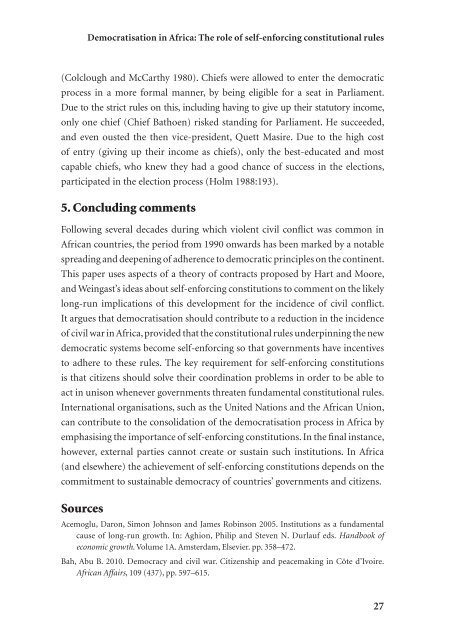ACCORD-ajcr-2015-1
ACCORD-ajcr-2015-1
ACCORD-ajcr-2015-1
- No tags were found...
You also want an ePaper? Increase the reach of your titles
YUMPU automatically turns print PDFs into web optimized ePapers that Google loves.
Democratisation in Africa: The role of self-enforcing constitutional rules<br />
(Colclough and McCarthy 1980). Chiefs were allowed to enter the democratic<br />
process in a more formal manner, by being eligible for a seat in Parliament.<br />
Due to the strict rules on this, including having to give up their statutory income,<br />
only one chief (Chief Bathoen) risked standing for Parliament. He succeeded,<br />
and even ousted the then vice-president, Quett Masire. Due to the high cost<br />
of entry (giving up their income as chiefs), only the best-educated and most<br />
capable chiefs, who knew they had a good chance of success in the elections,<br />
participated in the election process (Holm 1988:193).<br />
5. Concluding comments<br />
Following several decades during which violent civil conflict was common in<br />
African countries, the period from 1990 onwards has been marked by a notable<br />
spreading and deepening of adherence to democratic principles on the continent.<br />
This paper uses aspects of a theory of contracts proposed by Hart and Moore,<br />
and Weingast’s ideas about self-enforcing constitutions to comment on the likely<br />
long-run implications of this development for the incidence of civil conflict.<br />
It argues that democratisation should contribute to a reduction in the incidence<br />
of civil war in Africa, provided that the constitutional rules underpinning the new<br />
democratic systems become self-enforcing so that governments have incentives<br />
to adhere to these rules. The key requirement for self-enforcing constitutions<br />
is that citizens should solve their coordination problems in order to be able to<br />
act in unison whenever governments threaten fundamental constitutional rules.<br />
International organisations, such as the United Nations and the African Union,<br />
can contribute to the consolidation of the democratisation process in Africa by<br />
emphasising the importance of self-enforcing constitutions. In the final instance,<br />
however, external parties cannot create or sustain such institutions. In Africa<br />
(and elsewhere) the achievement of self-enforcing constitutions depends on the<br />
commitment to sustainable democracy of countries’ governments and citizens.<br />
Sources<br />
Acemoglu, Daron, Simon Johnson and James Robinson 2005. Institutions as a fundamental<br />
cause of long-run growth. In: Aghion, Philip and Steven N. Durlauf eds. Handbook of<br />
economic growth. Volume 1A. Amsterdam, Elsevier. pp. 358–472.<br />
Bah, Abu B. 2010. Democracy and civil war. Citizenship and peacemaking in Côte d’Ivoire.<br />
African Affairs, 109 (437), pp. 597–615.<br />
27


